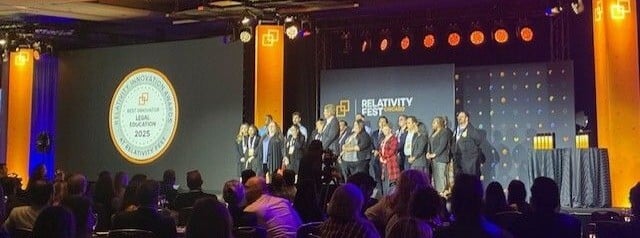This October, I attended Relativity Fest 2025 in Chicago. As one of the industry’s flagship events, I expected meaningful discussions about innovation, AI, and the challenges shaping our field, and those expectations were absolutely met.
I also had the privilege of serving as a mentor at this year's event, working with early-career professionals who are just beginning to find their place in this evolving space. That experience sharpened my perspective on leadership, adaptability, and the role that curiosity and empathy play alongside technical expertise in an AI-driven world.
Rather than recap sessions or product updates, I want to share a few reflections on what this year’s Relativity Fest reminded me about leading through change and how the future of legal technology is still, at its core, powered by people.
The Power of Community
One of the most notable aspects of the event was the level of interaction among attendees. Legal technology continues to evolve rapidly, and the strength of the community is evident in professionals who are willing to share challenges, ask tough questions, and learn from one another. The conversations were focused, candid, and rooted in the practical realities of implementing new tools and processes.
The mentor-mentee program was a true highlight of the conference for me. I found inspiration in the Relativity Scholars. Their enthusiasm, curiosity, and openness are reminders that our field is constantly evolving and shaped by new voices. Our group met on the first day to connect in person and came together several times throughout the event, and each conversation we had felt candid and deeply engaging at the same time.
Soft Skills in the Age of AI
Because of my role this year, I spent time musing on leadership - what it looks like today and how it has evolved since I started my career. Today, strong leadership in the age of AI requires empathy, adaptability, and intentionality. That is not to say that those aspects were not important decades ago, but they certainly were not at the forefront of the leadership conversation.
We know that Artificial intelligence is changing (and already has changed) how we work. And paradoxically, it is not replacing the need for human judgment, creativity, or resilience but rather highlights the importance of those traits in our work communications and interactions.
Since the conference, three ideas have stayed with me. First, AI is a tool and a collaborator. When used well, it expands our capabilities and sharpens our focus. Second, failure is not final. It is part of progress. Innovation demands experimentation, and that includes people making mistakes. Third, and perhaps most importantly, the human qualities of curiosity, grit, and empathy remain essential.
For leaders, these ideas require action. We must be intentional with our time and with our team’s time. We must create environments where it is safe to try something new, to make mistakes, and to learn from it. We must make space to refocus, especially in a field where the pace of change is constant. We must also recognize that work-life integration will look different for everyone. Sometimes work wins. Sometimes life does. The key is not balance. The key is awareness and choice.
Realistic Optimism
Looking ahead, I remain optimistic and realistic. Everyone is carrying more than what appears on a calendar invite. The pressure to perform, to adapt, and to stay current is real. Sustainable performance requires more than endurance. It requires a culture that values quality over quantity. It requires leaders who understand that constant churn may deliver in the short term, yet it depletes teams over time.
There is a great deal of possibility in front of us. The pace is fast. The work is deeply human. It will require a thoughtful kind of leadership, one that embraces technology without losing sight of the people using it. I look forward to continuing the work of mentorship and contributing to communities that support both innovation and well-being.
Closing Thoughts
I also want to thank the team at Proteus for continuing to build an environment where people and technology evolve together. Our work is not only about the tools we use. It is about the culture we cultivate and the trust we earn.
The future of legal technology will be shaped by both breakthroughs in AI and by the leaders who guide their teams through uncertainty with empathy, clarity, and courage. I am grateful to be part of that journey.


